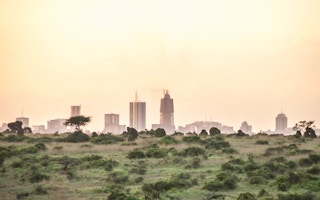As the COP27 climate talks in Sharm el-Sheikh, Egypt, officially ended, frustration is mounting among delegates and activists from the Global South. The lack of significant progress on crucial issues important to Africa – particularly on finance, adaptation and ‘loss and damage’ – has raised fears that the climate summit on African soil could end in a fiasco.
So disheartening is the state of affairs that Congo-Brazzaville’s environment minister Arlette Soudan-Nonault walked out before the end of negotiations.
Here in Africa, we have an abundance of renewable energy solutions, not least the largest solar potential of any continent on earth. What if this decisive moment, despite being frustrating and painful, were to push African countries to adopt a proactive posture of climate leadership and as providers of solutions, instead of being confined to an eternal narrative of being victims begging for funds?
Obviously, it is not a question of exonerating the rich countries from their historical responsibilities in the climate crisis. Global North countries must be held to account for their commitments and pledges made in Glasgow last year to limit global heating to 1.5°C above pre-industrial levels, and to double finance for adaptation to support climate-impacted countries. They must address ‘loss and damage’.
No backsliding on these gains can be allowed. If the conclusions of COP27 don’t build on the foundations of Glasgow’s agreement, it will be considered a failure and will be remembered as the COP that killed any hope of limiting global heating to 1.5°C.
The right choice for people, the future and climate
For a continent whose population is expected to reach nearly 2.5 billion by 2050, three sectors are highly strategic: agriculture, energy and employment. Feeding this growing population will require significant advances in food systems.
Agricultural progress will be a priority to deal with worsening climate impacts. Today, the continent has approximately 1.34 billion inhabitants, half of whom do not have access to electricity; 1 billion people do not have a clean source of energy for cooking.
“
With its immense deposits of clean energy, Africa could be a locomotive provider of solutions while fighting for real climate justice centred on people, nature and the climate.
The African continent faces a historic choice: quickly take advantage of its enormous renewable energy potential or follow the trajectory of fossil fuels which has led to the current climatic disasters.
If it makes the first choice, with the necessary structural and supply reforms, Africa will embark on a historic energy transition that will allow it to solve not only its energy deficit but also to limit the ravages of extractivism and fossil dependence, without forgetting the creation of employment for millions of young people who are currently trapped in rampant unemployment.
Sustainable community-led energy solutions do not compromise people’s health, natural resources or livelihoods. Renewable projects employ more people for every dollar invested than fossil fuels.
We see the opportunity for a bold vision for a sustainable and diversified economy which protects people’s rights, livelihoods, environment and futures. The International Energy Agency (IEA) estimates that these will cost $25 billion a year from now to 2030 – that’s the same price as building one new Liquid ‘Natural’ Gas (LNG) terminal a year.
Global South leadership
Despite growing interest in the exploitation of the continent’s fossil reserves due to the acceleration of European demand for gas, this option not only represents a high-risk choice economically, socially and environmentally, but also the perpetuation of a neo-colonial system which sees Africa as a region for resource extraction and export of raw materials to the detriment of the needs and priorities of its populations.
Whereas investing in renewables means betting on reliable, affordable, distributed electricity systems, centred on people and their sustainable development priorities.
The continent urgently needs a just and equitable energy transition that creates a new energy system based on renewable energy, easily deployable and decentralised structures that stimulate economies, promote livelihoods, protect and safeguard environmental socio-economic rights of current and future generations.
The world desperately needs decisive leadership to address the climate crisis. While the current cover decision text at COP27 is yet to reflect the negotiation rooms and civil society, Africa can lead the way to the future through bold and progressive plans and implementation on the ground. Kenya did so yesterday becoming the first African country to join the Beyond Oil and Gas Alliance (BOGA) as a ‘friend’. Other Global South countries such as Chile, Tuvalu and Fiji followed suit.
This is a significant development to be welcomed in a COP which placed particular emphasis on the role of fossil gas as a so-called ‘transitional fuel’ for Africa. Kenya’s example represents the change in the African vision of climate from being perceived as a victim to being solution-focused climate leader.
With its immense deposits of clean energy, Africa could be a locomotive provider of solutions while fighting for real climate justice centred on people, nature and the climate.
This story was published with permission from Thomson Reuters Foundation, the charitable arm of Thomson Reuters, that covers humanitarian news, climate change, resilience, women’s rights, trafficking and property rights. Visit https://www.context.news/.









